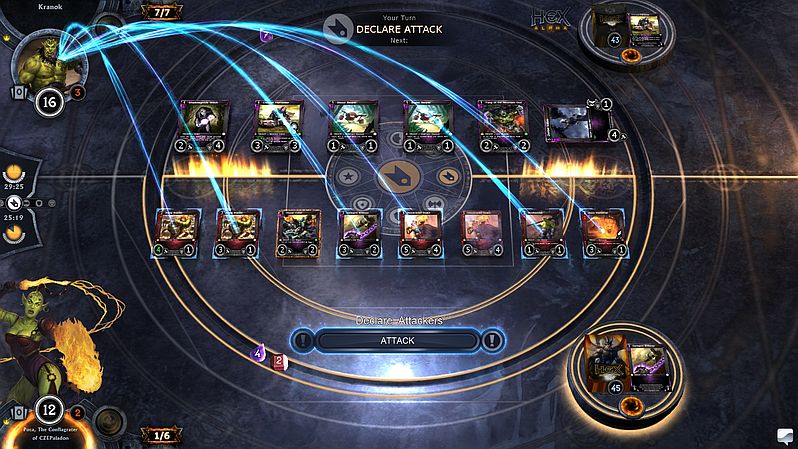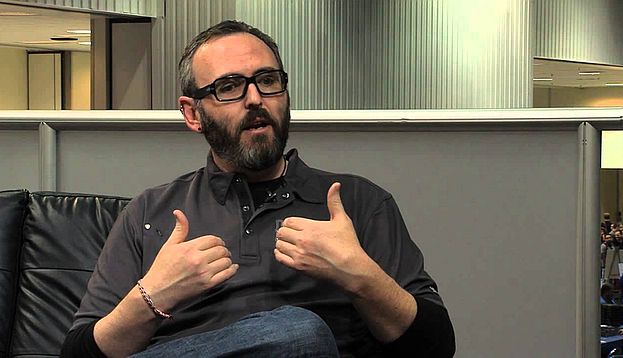When you’re looking for innovation in game design, one of the more successful startups is coming from longtime game veteran Cory Jones, formerly business development and international licensing manager for Blizzard. Clearly he’s using some of the same skills he brought to that position in creating and marketing Hex: Shards of Fate. As the game web site states: “HEX combines the amazing community and roleplaying aspects of a Massively Multiplayer Online Role Playing Game (MMO) with the compelling collectible and strategic gameplay of a Trading Card Game (TCG) to create an entirely new category of a game, the MMO/TCG.”
The realms of digital trading card games (TCGs) and massively multiplayer online roleplaying games (MMORPGs) are both highly competitive, and to attempt a blending of the two genres would seem overly ambitious from a game design standpoint and akin to stepping into a free-fire zone from a marketing standpoint. Still, the potential for such a genre-blending game is huge if you can attract fans of both genres, and that’s what HEX appears to be achieving. HEX: Shards of Fate founder Cory Jones spoke with [a]listdaily about the marketing challenges inherent in creating this ambitious game.
What’s the journey been like since HEX released, and where do you feel you are now?
The great news is that we are at a point now where the game is very accessible, very polished. We just celebrated the second anniversary of our Kickstarter. That’s a big milestone for us — it’s bitter and sweet, as they say. The game is not as far along as I would like in two years, but what we do have is very, very good. I come from Blizzard and the desire to make a quality game trumps the speed component at times, because I just don’t want to put out something that isn’t what I had envisioned. You talk about putting out an alpha, which we did, and I joke it’s like you have a brand new baby and you’re taking it to the playground, and it’s squirming and pooping and that’s all it does, it’s very embarrassing. I’ve finally now got a two-year-old that can go run and play with the other kids, and actually has some skills. We have a full-featured auction house, we’re about to launch our third set of cards, we have all kinds of tournaments, it’s a full-featured TCG that’s incredibly polished and incredibly fun to play. When it comes to all of the experiences we outlined, that stuff is in the game.

You had a very ambitious vision for the game. Do you regret having started with that broad a scope?
If we had just said “we’re going to make the best digital TCG possible we would have been done a year ago, but that’s not what our plan was. Our plan was to make this MMO/TCG hybrid and create something brand new, do something no one’s done before. The reality of inventing is there’s a lot of trial and error, and there’s a lot of unknowns. We paid the price for innovating. The upside, of course, is as the TCG market heats up with Hearthstone, I am so far ahead of what anyone is even thinking of doing that I have created a space for us to be successful and not really feel the heat of competition. What I’m doing is different, it’s very different from what anyone else has done.
You have a solid base of players now, and Hearthstone has greatly increased interest in the category of TCGs, but how do you leverage that to increase your base?
The big focus for us is that we’re lucky in that we’ve built an actual free-to-play model, not an exploitive free-to-play model. For me , free-to-play means “I have designed a game that’s very enjoyable to begin with, but then becomes increasingly less fun to play until I convince you to spend money to go back to the place where you liked it.” That’s what the free-to-play model is. What we’ve done is to create something which on its face that says free to play but is actually very different. When you enter in to our game you a starter deck, you get to play through some starter deck trials, you win some extra cards. From that point forward you’re sort of own your own. You can play in our Frost Ring Arena, which is free, and win cards, win equipment. We’ve got any auction house that works on both soft and hard currency. What we allowed to occur — and I worked with an economist for six months — is our players determine value of elements and and allow them to freely exchange earned and bought currencies.
So what’s happened is the very rare stuff is valuable. We’ve allowed through that free-to-play player to earn things and turn that into currency through the auction house. So playing our game, you earn about 90 cents to $1.20 an hour playing our game, if you turned all the stuff you won into currency. There’s no other game like that — most are about 5 cents an hour. TCGs monetize just fine, I’m not worried about it. I feel like if you play our game you’ll see how awesome the value is and eventually you’ll want to buy some packs. I’m not worried about wringing a dollar out of our consumers.
Do you have a marketing strategy for HEX moving forward?
We’ve been having that conversation. Our focus has been on making the best game possible. I feel like it’s a wildly underserved audience – when it comes to real, full-fledged digital TCGs you don’t have a lot of options. Yet TCGs are a multi-billion dollar a year industry. You have tens of millions of people who play TCGs, so my goal was to make the best possible game to give them something to gravitate to. That’s been playing out pretty well so far. Starting in July we are actually putting together a much larger marketing budget. More traditional marketing to get the message out is something we’re focused on. The great thing about TCG players is they are a community. Once you start to influence parts of that community, it has a tendency to spread to the rest of that community.
Some of the stuff that we can do that’s really about the game, we have our first big eSports event that’s coming up. This patch puts in the back end for tournaments to allow us to do eSports. The prize pool is $100,000 for this televised eSports event. We think this will help get some eyeballs on it and gain the attention of some serious card game players.
How important has streaming been to spreading the word about the game?
For us it’s been great. We have a pretty reasonable number of dedicated streamers, their audiences range from a hundred to four hundred people pretty consistently. We’ve been lucky, we have some very passionate people in our community. It seems like we’re getting bigger and bigger, but the spirit of our community is persisting. We aggregated with our Kickstarter a number of like-minded people, typcially people who were a little older. They wanted to play TCGs in the real world but they have to do it digitally, a lot of them are very created and they could see the vision and believe in the dream. A certain type of person ended up in the Kickstarter, and the great thing was they ended up being an amazing community.

